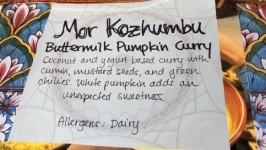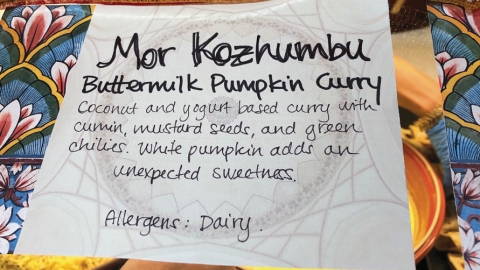Food For The Work Culture : Playground Global
It’s lunchtime at Playground Global, a Palo Alto–based early stage venture firm and work-share space for its portfolio companies. But this is no ordinary lunch service. It’s the highly anticipated final day of Playground’s annual “Iron Chef” competition, and the employee and portfolio company chefs are flying around the room adding finishing touches to their two spreads of exotic Indian and Chinese dishes.
Edible Silicon Valley editors had the delicious honor of judging the final round in this head-to-head contest between employees of two of Playground’s resident portfolio companies, competing for bragging rights as the best chefs. The teams were responsible for recipe development, menu selection and preparing and serving their dishes and themed menus. Each team received coaching and cooking instructions on how to feed over 300 people, with support from one of the talented on-site chefs who typically craft their daily meals at work.
As we tuck into dishes of spice-rubbed Indian lamb chops, buttermilk pumpkin curry, sevai (lemon rice noodles), gochujang chicken sliders, xiao long bao dumplings and sesame pea shoots, one thing is clear to us: Everyone in the building has abandoned their desks to be here, eating together, right now.
The winning “Iron Chef” team from the on-site company Essential won the competition with their Indian-inspired meal.
And that’s the point of this competition, says Jeff Freburg, Playground’s head of employee experience and culinary ventures. “Great food brings people together. Silicon Valley companies know that. It’s great for recruitment, retention, collaboration, corporate culture and employee health.”
Freburg should know. He was one of the original executive chefs and developers of the food program at Google, the mothership of free, upscale and farm-to-cafeteria food programs that are common in Silicon Valley and now catching on across the country.
But don’t call them “cafeterias.” These are chef-driven cafés and restaurants, often staffed by former chefs and chefs de cuisine from top Michelin-star restaurants in the area, like Madera and Plumed Horse.
Freburg can trace the evolution of the culinary culture through his experience at Google, and later at Square and now at Playground.
Jeff Freburg of Playground Global uses food to connect and energize people and ideas in Playground’s cafe.
“It started at Google as a way to keep employees on site longer,” he said. Instead of employees spending an hour away from their desks trying to find lunch, it made sense to bring food—and healthy food at that—right to the building.
Jeff helped Google open several campus cafés, each catering to different kinds of food and giving chefs enormous budgets and latitude for creativity. Produce and meats were sourced as locally as possible and prepared with an eye toward health. The dizzying array of upscale food soon became a recruiting—and retention—tool, and an employee benefit that other companies needed to match in order to attract top talent.
It’s common at Playground for interviews with prospective employees to be scheduled for lunchtime, helping recruits to envision a work culture where breakfast, lunch and dinner are available to them every day, for free.
Stealth Health
Yet underneath all the hype about free food is something more sustainable and important—and that is the desire of companies like Google, LinkedIn, Facebook, Playground and others to provide real nourishment to employees to help them achieve their peak performance.
“People at Playground can get 80% of their daily nutrition right here, so we need to make our food as healthy as possible, whether employees know it or not.
So Freburg practices something he calls “stealth health.” “We find ways to make eating at Playground healthier, even though diners are unaware of our methods.”
Case in point: Menus at Playground are heavily centered around vegetables and fruits, with meat offered in moderation. Ingredients are listed on a stand-up sign in front of each dish.
“At Google we learned even though the ingredients were clearly spelled out, employees weren’t reading them. So we made it really simple. Menus printed in green meant the dish was healthy, yellow meant caution and red meant eat at your own risk.” Freburg has followed a similar process at Playground, for a simple reason: “We care about employee health.”
Desserts? Of course! But at Playground, Freburg specifies that all desserts must contain 100 calories or less. He does this through decreased portions—think two-inch squares of tiramisu—and by reducing sugar in all desserts. “We started by reducing sugar 2%, then another 2% and then another 2%. And no one noticed!”
To help with portion control, Freburg eliminated trays in the Playground café. “People tend to eat first with their eyes, and seeing entrées, soups, salads, desserts along the counter looks so enticing they pick up more than they can really eat. Without trays, people need to come back to the counter to pick up additional dishes if they’re still hungry.”
Delicious, healthy, on-site food helps many Silicon Valley companies recruit and retain employees.
But stealth portion control doesn’t stop there. “We use rimless, 10-inch round plates,” he says. “With rimmed plates, people tend to pile more food on a plate, knowing inherently that the rim will keep food from falling off. But they don’t have that option with a rimless plate, so they take less.”
Not only do these tactics help keep portions in control, they also help prevent food waste, eliminating trays of partially eaten food being thrown away.
When someone wants a snack between meals, there’s a solution for that in the form of micro-kitchens scattered across the Playground building. There are plenty of snacks to be found—but the most accessible ones are the healthiest. Bananas and apples are on top of the counters. Directly below on shelves are dried fruit or trail mix. Finally, at the bottom in opaque containers that hide their contents are M&M’s and other sugary treats.
It’s the same with beverages, in both the café and in the micro-kitchens. Sparkling waters and unsweetened teas are on the top of the self-serve refrigerators, with soft drinks at the very bottom.
Casual Collision
The good food may get people to leave their desks, but there are other schemes in play to encourage them to mix and mingle with each other.
“This is one time where it’s actually good to have to wait in line for your lunch,” says Freburg. “You end up talking to the people next to you—engineers from different portfolio companies or co-workers from other departments—that you might never otherwise talk to. And that can bring about some pretty amazing results.”
Freburg relates the story of how some Google engineers—from completely different departments and functions—were waiting in line for lunch. They got to talking and brainstormed about how they could create a Google-branded email program. The result? The ubiquitous Gmail, now the world’s most popular email client.
This “casual collision,” as Freburg calls it, is encouraged at Playground because it helps percolate creativity and innovation among the portfolio companies. He takes it a step further by featuring different brands of coffee—currently Stumptown, Ritual and Linea—and different snacks in each micro-kitchen, enticing employees to move around the building as they recharge during the day.
“Jeff designed the micro-kitchens to be places for employee interaction,” says Janet Titzler, an employee recruiter for Playground. She says that while people wait for their espresso or latte to brew, they end up talking to each other, often with people they wouldn’t normally meet. “It’s the caffeinated version of the water cooler,” she says.
Fueled for Success
“When I bring prospective employees into Playground for lunch, they see the energy and creativity that the kitchen team puts into its food program, which is the same passion the candidates observe with engineers in the labs,” says Janet. “It all combines to showcase a place where people are excited to come to work each day.”
Just as the meal with the candidate is wrapping up, Playground’s Chef James Klimowski might pop over to the table, bearing a house-made lollipop or the company’s signature chocolate chip cookies. “Does this happen every day?” asks the candidate with wonder.
Pretty much.
Welcome to Playground, whose corporate culture is steeped in innovation and collaboration —and powered by spectacular, healthy food.






